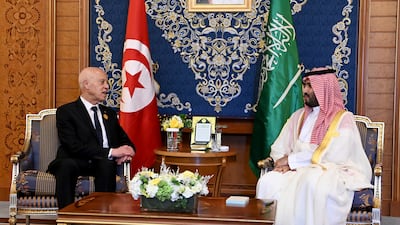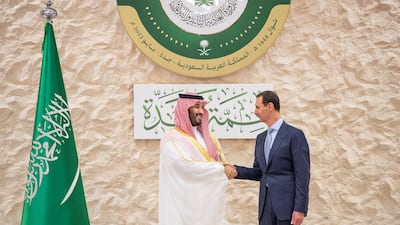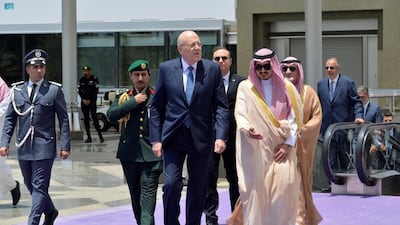The Arab League has called for practical and immediate steps to solve the Syrian crisis and safeguard unity and sovereignty in the country, in the final communique of its summit in Jeddah on Friday.
Practical steps must “meet the aspiration of its people and rid the country of terrorism” as well as create suitable conditions for the “natural and safe number of refugees”, said the Jeddah Declaration issued at the end of the summit on Friday.
Syrian President Bashar Al Assad was given a warm welcome at the Arab League summit on Friday by Saudi Arabia's Crown Prince Mohammed bin Salman, who embraced the once-shunned leader.
Arab leaders had ostracised Mr Al Assad's government after a crackdown on protesters in 2011 led to a civil war that has resulted in the deaths of more than half a million people and the displacement of millions of Syrians.
Sheikh Tamim, the Emir of Qatar, and Egyptian President Abdel Fattah El Sisi also shook hands with Mr Al Assad.
During an address to fellow leaders, Mr Al Assad voiced hope for a new era of Arab co-operation, as his country was welcomed back to the Arab League after 12 years of suspension.
“I hope that it marks the beginning of a new phase of Arab action for solidarity among us, for peace in our region, development and prosperity instead of war and destruction,” Mr Al Assad told the summit.
The final communique also addressed the conflict in Sudan, which began more than a month ago when two generals started fighting for control of the country, following disputes over the integration of the Rapid Support Forces militia into the army.
Sudan's army chief Gen Abdel Fattah Al Burhan – who sent a representative to the summit – took the long-expected step on Friday of removing paramilitary RS chief Gen Mohamed Dagalo – better known as Hemedti – from his post on the ruling Sovereign Council.
Ongoing talks in Jeddah
When asked about the latest US-Saudi efforts regarding efforts to end the conflict in Sudan, Saudi Foreign Minister Prince Faisal bin Farhan said that the kingdom was still working with Washington to reach a humanitarian truce.
“The situation in Sudan, especially the humanitarian aspect of the conflict, is very dire at the moment and we’re trying from all the diplomatic fronts to push for a truce,” Prince Faisal said.
The Saudi Foreign Minister called on the Sudanese parties to “show responsibility” and resort to dialogue, noting that the Jeddah talks on Sudan would continue in the days to come.
“But it is too early to talk about a breakthrough at the moment,” he added.
The summit focused on the themes of “renewal and change”, as part of the Saudi Crown Prince’s recent efforts to realign foreign policy and engagement in the region.
Riyadh has improved its relations with Iran, restored ties with Syria and is ending the kingdom’s years-long war in Yemen.
Iran, a main backer of the Syrian government in the country's conflict, signed an agreement in China in March to resume relations with Saudi Arabia.
Tehran has also expressed its support for Damascus’s rapprochement with its regional neighbours.
The Arab League’s final communique also mentioned Iran’s nuclear ambitions, saying that any deal with Tehran must directly address the country’s behaviour on the regional stage and its use of proxy groups.
In total, the league passed 32 draft resolutions as part of the Arab action plan for 2023.
'Long way to go'
During the summit’s final press conference, the exercise in mutual dialogue was put the test when one of Syria’s state television reporters confronted Arab League Secretary General Ahmed Aboul Gheit on the body's relevance.
The reporter began by asking a question that slowly devolved into a monologue before abruptly asking Mr Aboul Gheit for his thoughts on the “Arab street no longer paying much attention to the Arab League’s work and mechanisms”.
The question irked Mr Aboul Gheit, who interrupted her, saying he did not agree with the question implying the body he heads has lost influence on the regional stage, given the high-level representation from league members at the summit as well as the number of reporters present.
“It’s ironic that this quarrel spoilt the end of the summit but that is an analogy of how far we still have to go in listening to each other despite our difference in approaches toward further co-operation after a decade of not seeing eye to eye on a lot of issues,” one Saudi official told The National after the press conference.
Ending crises
The Arab League’s summit in Jeddah has been a test for Prince Mohammed’s plans to realign the region after more than a decade of conflict.
During his address at the summit, he said he hoped Syria's “return to the Arab League leads to the end of its crisis”.
Saudi Arabia would “not allow our region to turn into a field of conflicts”, he said and added the page had been turned on “painful years of struggle”.
Washington has objected to any steps towards normalisation with Mr Al Assad, saying there must first be progress towards a political solution to the conflict.
“We understand the point of view of the United States and our partners in the West, but addressing the ongoing challenges requires a new approach and that will not come without dialogue,” Prince Faisal told a news conference at the end of the summit.






















































